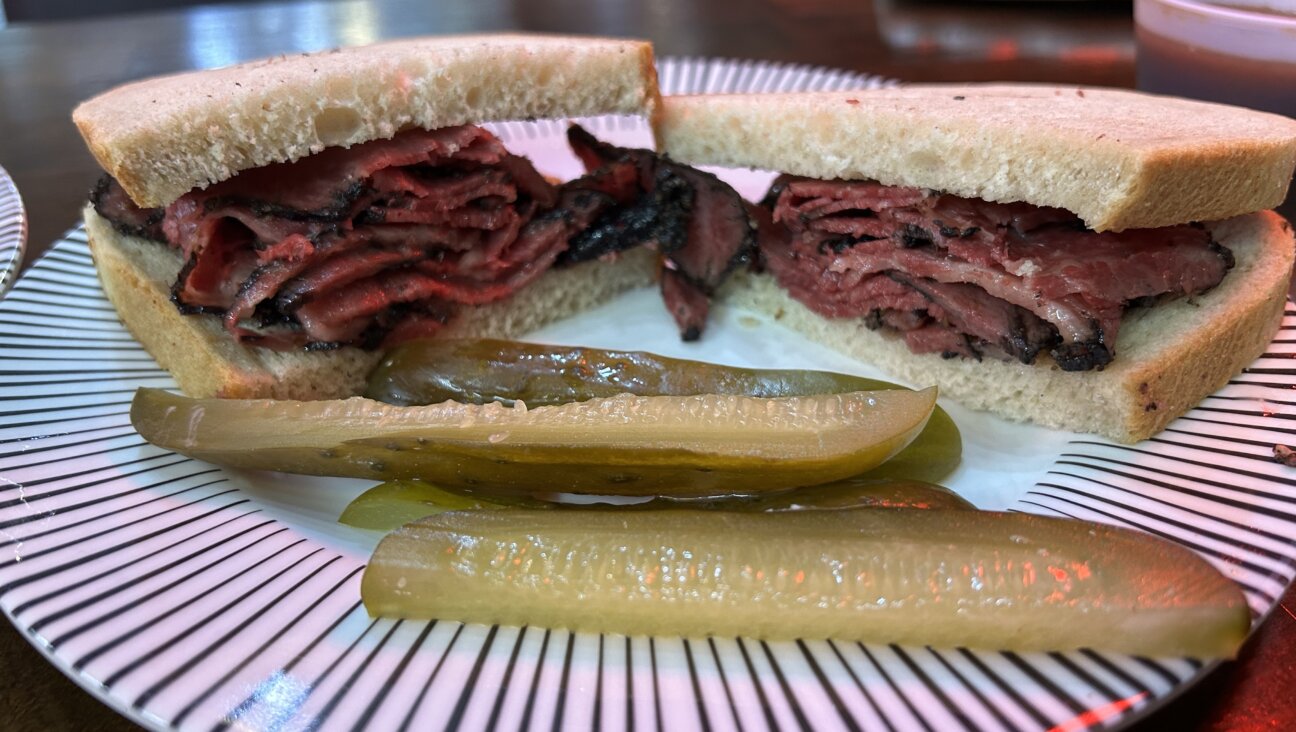Yemen’s Stimulating Drink Makes Its Way to Tel Aviv

Image by Courtesy of Haaretz
Reprinted with permission from Haaretz
People often walk into the Tel Aviv restaurant Michal Levit manages and ask her why the juice is so expensive.
The drink she sells in Hame’orav restaurant on Allenby Street is not exactly lemonade. It’s a stimulant and appetite suppressant that promotes wakefulness, sexual potency, and greater capacity for alcohol consumption.
Levit has found a way of turning juice into gold. It’s easy being an alchemist if the material you’re working with happens to be khat juice, the official picker-upper of the summer of 2012.
As Levit explains, slowly and patiently to the uninformed, khat juice is not any old freshly squeezed juice. Khat (pronounced as gat with a hard “g” in Hebrew), or Catha edulis, is a flowering plant native to the Horn of Africa and the Arabian Peninsula, and in this particular case its extract is mixed with sweet lemonade.
Among communities from these areas, chewing khat leaves has a long history as a social custom dating back thousands of years; it was brought to Israel by immigrants from Yemen. As a freshly pressed extract, it is particularly potent. It’s a stimulant and appetite suppressant, and its use results in wakefulness, sexual potency, and greater capacity for alcohol consumption.
Khat juice drinkers say that if you imbibe in the early evening you’ll have the stamina to dance or make love all night long. But while the street is embracing the new “happy coffee,” the medical establishment views khat as a drug for all intents and purposes. The active ingredient is cathinone, an amphetamine-like alkaloid, sold in different convenience store products labeled “Hagigat” (khat party ), and poses both short-term and long-term health risks, but the use of the leaves is legal and its hangover is minimal.
Since last year khat juice has been trickling from open-air markets and Yemenite backyards to the club and bar scene, music festivals, and other events. It can easily be obtained via Facebook and at Tel Aviv and Jerusalem kiosks, and — to the astonishment of elderly Yemenites — it has also begun to appear in small restaurants. Hame’orav is considered a pioneer in the field.
At this crowded spot, where top ten lists from all decades are played all night long, khat juice — the current hottest hit — sells for NIS 24 at all hours of the day and night. “We were introduced to khat juice at a party in Jerusalem about a year ago,” says Levit. “There was this guy there with a stand getting a lot of attention. It occurred to us that we’ve got to bring this to Tel Aviv. We thought it’d go well, but it’s exceeded all our expectations. We’re getting vans and mini-buses filled with people showing up here early in the evening.”
Why do you think it’s going so well?
“People like to draw the night out, and this helps them to feel more sober even if they’re drunk. During the day, we have people from the office towers coming for a serving of khat to help them get through the rest of their working hours. We have a huge clientele — chefs, musicians, actors.”
Why would the restaurant serve an appetite suppressant?
“I always suggest that guests eat before they drink, and then choose a drink. All these anorectic types are very interested in this property of the stuff, but I won’t serve them khat juice before they’ve eaten something.”
What’s the legal status of the juice?
“As long as the juice is extracted on the premises, there’s no problem.”
Rotting grass
On Friday nights, the restaurant is packed. Even in the early evening hours, revelers jam the entrance, some scarfing down food, others lounging on the adjacent bus stop bench talking about the parties they’re going to hit up during the night.
A quick shot of khat juice results in a struggle to avoid the taste of rotting grass clippings. A young man with extensive khat experience exhorts: “Let your tongue play with it. Let it sit in your mouth for a while, as if you were chewing khat leaves. It kicks up the effect.” He rubs his hands with pleasure.
“I need eight shots for it to work, because I live in Kerem Hateimanim [the Yemenite neighborhood behind the Carmel Market in Tel Aviv] and they’ve been selling khat juice there for years.”
“Coffee also tasted disgusting to me at first,” adds a photographer, commenting on the nasty flavor. A young student, who describes herself as shy, says: “I had some khat juice this week and all I got out of it was a headache. The next day I invited the guy who’d bought it for me on a make-up date.” She pulls out her smartphone and shows me the Facebook message in which he turned her down. But that’s not the point she took away from the incident. “I think that without the khat I would never have had the courage. This is a drug the cowardly lion could have used,” she giggles.
Drug? Truth be told, the hipsters on the street don’t think of it that way. People who abstain from drugs in general drain the last drop of their khat juice and report only good effects. It’s only juice, right?
At Cafe Kaimak, in the heart of Levinsky Market in Tel Aviv, khat juice is a standout on the revolving menu. The waitress admits that one shot has no effect at all; you need more than that to get into the groove.
In the meantime, as the product is legal and in demand, it is also marketed via various social networks. Adam Kabah, for example, sells Ethiopian khat in different flavors over Facebook after years of having consumed khat leaves in various forms. Even though he attests to the product being natural and safe, he’s not willing to sell the drink to just anyone. “It’s not recommended for people with heart problems because it’s a stimulant. It’s also not good for diabetics. You could make the juice sugar-free, but we don’t want to take any risks,” he says.
Twice I had a shot of khat juice and it had no effect on me.
“You probably had juice from khat leaves that weren’t strong enough. There are all sorts of types of khat and all sorts of people making juice. One glass of Ethiopian red khat juice kicks in right away. The manner of preparation matters. Some people just grind the leaves and separate the juice while others refine the plant 100 percent. People who just make shakes have no clue.”
How did the juice make the jump from convenience stores to restaurants? The answer lies in the product’s unclear legal status. No restaurant would dare serve cocaine, but if a bottle of khat juice makes it way into restaurant kitchens or into the hands of chefs and waiters it very soon finds its way to customers too, a treat for special clientele. Having a bottle of khat juice in the kitchen is considered perfectly normal at restaurants and cafes in the greater Tel Aviv region. They all have their recipes: mixed with cranberry juice, arak or sweetened lemonade.
A skinny, serious-looking attorney says that he was sitting at one of these restaurants in the center of Tel Aviv and was served a glass of khat juice at the end of his meal. “Maybe shift managers buy the stuff to make their waiters scurry around like mice?” he wonders out loud. “It used to be that they’d smoke bongs in the back room; now they’re drinking khat juice in the restaurant itself, right out in the open.”
A new convert
About six months ago, chef Nir Tzuk, enthused and in love, poured me a shot of khat juice at Cordelia’s in Jaffa. “You’ve got to try it, it’s amazing. I can stay awake all night and maintain peak concentration,” he told me and continued enumerating its fabulous qualities like a new convert. At the time he was serving khat juice to restaurant regulars as a special, off-menu drink, “particularly to my friends, people whose happiness is dear to my heart.”
But he’s recently changed his tune and given khat juice the old heave-ho: “I stopped serving it because too many places started offering it. I mean, it’s illegal; you’re not even allowed to sell it in Holland. Here in Israel you’re only allowed to consume khat in leaf form, for chewing, the traditional way. What’s happening is that people buy the leaves and pulp them into this juice-like stuff. It’s borderline. The moment I understood it was becoming an issue in Tel Aviv I got rid of it. I’m also not using anymore; it’s a crazy drug.”
So, you’ve also stopped?
“Listen, I think it’s an amazing juice. You wouldn’t believe how it hones your thinking. It’s natural, it goes great with arak, and improves your ability to handle alcohol like crazy. When I need to stay sharp and work in the kitchen for three days straight, then this is exactly what I want. Were you to show up with a bottle of khat juice and some arak I’d probably join you. But I prefer not to have it around or to sell it, because it makes me feel queasy. I recognized that it drove my body into a tizzy. I wasn’t sleeping at all.”
But how did you let an appetite-suppressing drug through your restaurant doors? Where’s the business sense?
“I had no idea. When you drink khat you’re on such a high that you don’t even notice that you’ve skipped meals. But now that you mention it…”
If khat is a drug, why is it legal to chew its leaves?
The Israel Anti-Drug Authority is now considering how to relate to “the growing phenomenon of “khat juice sales” and is, together with the Justice and Health Ministries and the Israel Police, formulating recommendations. The authority told us that “The growing use of khat and its use as an ingredient in drinks served in bars, clubs and restaurants, is problematic, but the legal solution must also provide an answer to the issue of equality before the law as this relates to the use of all khat products.”
The medical establishment is also intent on playing the role of party-pooper. Dr. Shlomo Almog, a senior researcher at the Toxicology and Clinical Pharmacology Institute at Tel Hashomer-Sheba Medical Center, points an accusing finger at juice consumers. “They’re irresponsible. They have no idea what this could do to them in the long term. I’m not saying that if you drink khat juice you’ll drop dead right away; the likelihood of that happening is practically nil. But over time, the statistics can happen to you too.
“The effect of khat is similar to that of all stimulants. It causes euphoria, lifts your mood, gives you a sense of liberation, an illusory feeling of increased self-confidence, satisfaction and sociability; it helps concentration and increases energy thanks to elevated adrenalin levels in the brain. As an immediate effect, it is sexually stimulating and potency enhancing, but when it wears off there’s a sharp drop in sexual desire and one’s ability to concentrate is gone.
Heart attacks
“Khat causes users to party way beyond their capacity. One of its most dangerous features is the fact that it raises blood pressure and can lead to a stroke and that it increases pulse rates and can lead to a heart attack. When khat wears off, there’s a sudden fall: exhaustion sets in and your mood plummets.”
As for long-term use, Almog cites increased risk of the following: “Dependence and addiction, that is larger doses at increasing frequencies, psychiatric illnesses such as paranoia and schizophrenia, myocardial infarction, certain types of mouth and throat cancer, chronic hypertension, irregular heartbeats, repeated infections of the gums and tooth decay, loss of male fertility, delivery of stillborns or underweight infants in pregnant women.”
Can you become addicted to khat juice?
“The risk of cathinone addiction is lower than that of Ecstasy or cocaine, but it’s there. Your elderly Yemenite gentleman chewing with his buddies couldn’t get out of bed without his khat. He’d be limp like a dishrag. What’s keeping him going and his blood pressure up is the khat.”
So how come it’s legal?
“Hagigat products and cathinone come under the rubric of the Law of Dangerous Drugs. Obviously the juice is also a dangerous drug, and it should have been included in the law. But you can’t make a law that takes a large group of law-abiding citizens for whom chewing khat is part of their tradition and history and criminalize them. So the legislature made a sociopolitical decision that khat, in plant form, would be excluded from the law. It’s also important to understand that the fact that it’s natural doesn’t mean that it’s good. Snake venom is also natural. Khat juice contains cathinone, and it makes no difference whether it was produced under lab conditions or grew on a bush. As far as the body is concerned, it’s the same molecule.”
Check out more food and drink stories on Haaretz, here.






















